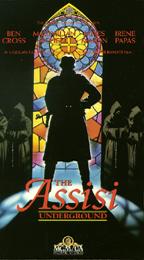
THE ASSISI UNDERGROUND
US, 1985, 115 minutes, Colour.
Ben Cross, James Mason, Irene Papas, Maximilian Schell.
Directed by Alexander Ramati.
The Assisi Underground was a story of Italian resistance and smuggling of Jews out of Italy written in a documentary style by Alexander Romati. He has adapted his novel for the screen and directed the film version of it
On the whole, the interesting story keeps audience attention. However, it is familiar material from many war resistance stories - and the focus is on the basic plot-line rather than the delineation of characters. To that extent, it is of average interest and entertainment.
Italian and Assisi locations add considerably to the impact of the film. Ben Cross is the Franciscan friar who helps with the Assisi Underground. James Mason, in one of his last roles, is the Bishop of Assisi, and Maximilian Schell is a sympathetic German Colonel. Edmund Purdom has a brief role as a Cardinal, Irene Papas makes a strong impact as the Poor Clare Abbess.
The material was better done in the film version of The Scarlet and the Black, the story of Monsignor Hugh Gallagher and his helping so many troops escape via the Vatican,(filmed with Gregory Peck and Christopher Plummer).
1. An interesting and entertaining war story? The war in Italy? The underground? The fate of the Jews? The defeat of the Germans?
2. The use of Italian and Assisi locations? Authentic atmosphere? The visual impact of the Italian countryside and the mediaeval towns? Action sequences? Effects? Musical score?
3. The focus on Assisi, the tradition of St Francis, poverty and charity? The Franciscan Friars? The Poor Clares and their sheltering the refugees? The Bishop of Assisi and the Cardinal?
4. Father Rufino? The credibility of Ben Cross in the role? His work in the friary? In Assisi? his being summoned by the Bishop? The commission to aid the Jewish refugees? The dangers? The encounter with the professor and shielding him? Disguising him as a friar? The encounters with the German authorities? The local authorities? The sympathetic Colonel and his concern about Assisi? Sheltering the refugees in the convent? Quick timing, train trips, cars, boats? his almost drowning? The links with the Underground? Saving people? His arrest, torture, his not confessing? The false execution and the pressure on him? His release? The freedom of Assisi? The final celebrations? The Allies arriving? Portrait of a good and courageous man?
5. The church authorities and their attitudes towards the Jews, the refugees? Religious difficulties? The humour of the Jews disguised as friars and Catholics? Saying Christian prayers? Reading the Breviary, giving blessings? The Bishop and his pressure on the Abbess? The freedom of Assisi? The collaboration with the Cardinal in Rome and his concern? The Abbess and her wanting enclosure, her strength of character, the other nuns and their running the hostel, the Germans intruding, searching for the professor? Her obeying the Bishop? Because of the Pope? Her sheltering the refugees, her confrontation with the German authorities?
6. The German Colonel and his culture, sympathy, appreciation of Assisi? His helping Rufino? The irony of his comment at the end that he thought he was the head of the Assisi Underground? His delight in Assisi becoming a free city?
7. The Jews and their plight; their backgrounds, the professor and his being shielded, taken in the cemetery, helped by the local deputy mayor? The ecumenical tones of this collaboration between Christians and Jews?
8. The local Italians, in authority, collaborating with the Germans, against them? The changing of orders - especially for Assisi being declared a free city?
9. The various people passing through, the Countess? Local attitudes? Collections for finance to help the cause? The collaboration of the local people? The dangers, the hostages and the executions?
10. Peace and the final rejoicing? A story of wartime heroism?